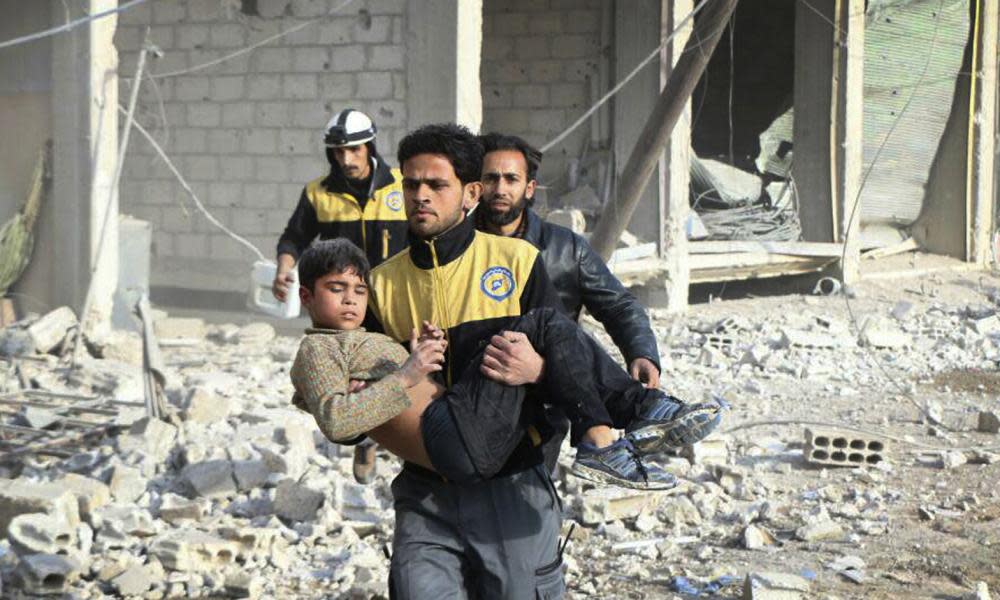My staff are trying to save lives in the rubble of Ghouta. Who will help us?

As Syrians, we have experienced death in so many more ways than we ever dared to imagine: we have been killed by barrel bombs, chemical weapons, starvation, drowning, torture, napalm and cluster munitions. This month, in eastern Ghouta, another encounter with death was added to the list: a mother’s corpse dug from under the rubble by her own son, a White Helmet volunteer.
The situation in Ghouta would break any heart. Some in the international community have run out of words and have stopped describing the horror. But the suffering of my people compels me to speak in direct terms: the world has left hundreds of thousands of civilians to starve or be bombed to death by the Syrian regime and its allies.
Ghouta has endured a barbaric siege for five years, cut off from food and medicine, but nothing has prepared us for the past 48 hours. Dozens of barrel bombs – improvised weapons filled with explosives, shrapnel and anything that will rip through skin – have been dropped on homes. Hundreds of missiles have been fired. Eight hospitals have been struck. More than 250 people have been killed and the death toll is rising by the hour. Thousands have been injured. All of this in an area of a little over 40 square miles.
Families in eastern Ghouta have been hiding in basements for weeks at a time, too scared to go above ground, but even these makeshift shelters are being shattered by relentless bombardment.
White Helmet rescuers in Ghouta are facing hell: they’ve left their families, often without the basic necessities, to rescue others. Some have returned to find their families had been forced to flee. White Helmet teams were targeted while on a rescue mission, and a volunteer was killed. This is not a war: this is a massacre.
Where is it and why is it important?
Eastern Ghouta is a rebel-held enclave that borders the city of Damascus. Once a breadbasket of the Syrian capital, since 2013 it has been under a siege that has tightened severely over the last year. In 2013 the area was targeted in a chemical attack by the Syrian regime that killed more than a thousand civilians and nearly prompted a US intervention in the war.
Who controls it?
The enclave is controlled by a mix of rebel groups dominated by the Islamist leaning Jaysh al-Islam, though the day-to-day affairs of the towns in the area are run by local civilian councils.
How bad is the humanitarian situation?
The situation is catastrophic for the 400,000 civilians who still live in eastern Ghouta. Prices for basic foodstuffs have skyrocketed and medical supplies are mostly absent because of the siege. Treating the injured is especially difficult because of the repeated bombing of hospitals and clinics.
An estimated 700 civilians have been killed in the area in the last three months alone, not including those killed over the last week of escalation.
The first aid convoy to the region in months arrived a week ago but did not do much to alleviate the suffering.
The deteriorating situation across the country is stretching the White Helmets like never before. We have lost nine volunteers since the start of the year and more than 50 have been injured. The attacks on our centres and missions have destroyed much of our life-saving equipment and ambulances, making the work of saving lives much more difficult. My medical colleagues are suffering the same strain.
In our work, we have saved more than 100,000 lives over the past four years, often by carrying civilians in our arms to the safest place we can find. In eastern Ghouta, nowhere is safe and there is no escape. All we can do is rescue people from immediate danger and hope and pray that the hospital or home where we leave them is not struck immediately. Can you imagine making such decisions, with jets overhead?
All this is happening only a 20-minute drive from Damascus, from UN headquarters and the palace of Bashar al-Assad; a few hours on a plane to Geneva, where “peace talks” are happening. But as you look at the pictures of dust-covered people emerging from rubble or kids screaming out in pain, it could be another planet – one where the worst of humanity is in charge. For we have never seen anything like this before in this world.
I am a Syrian humanitarian, not a politician, so forgive me if I appear naive when I fail to believe that the world’s most powerful countries cannot protect children from waking up tomorrow in the rubble of their homes, their parents nowhere to be found. The Syrian people hold international leaders responsible for failing to prevent their suffering, and demand that they use all measures available to stop the aerial attacks, break the siege and immediately evacuate the hundreds of people in need of urgent medical attention. The White Helmets’ motto is: “To save a life is to save all of humanity.” I ask those who can to join us in our mission.
• Raed Al Saleh is the head of the Syria Civil Defence or White Helmets

 Yahoo News
Yahoo News 
